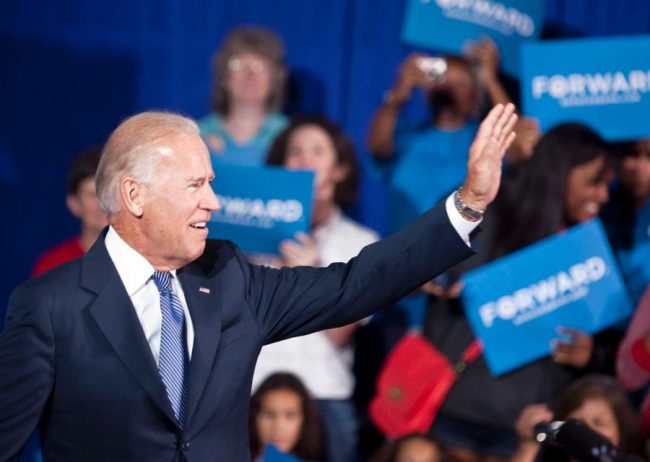
Vice President Joe Biden speaks at a Virginia Tech campaign stop in Blacksburg, Va., Aug. 15. (AP)
Over the last week, the two vice presidential candidates have stood in stark contrast to one another.
Paul Ryan has been going on the offensive about the need for substantive Medicare reform, while Joe Biden stumbled through an endless number of gaffes, to the point where speculation grew that he might be dropped from the ticket.
In case you missed them, he told a group of black supporters that President Romney would put them back in chains. He rallied supporters in Virginia to help the president win North Carolina. He referred to congressman Ryan as Gov. Ryan. He implied that we were still living in the 20th Century. And that was all just in two days of campaigning. It got to the point where Biden was even sent home to Delaware on a short vacation to keep him off the campaign trail.
This was certainly embarrassing for the president’s campaign, but the rumors that Biden would be replaced as vice president with Hillary Clinton were as absurd last week as they were back in 2008.
Vice presidential speculation is always fun, as it lets ordinary voters into the minds of the candidates, giving us a sneak peek into their decision making process. This is precisely the reason that unless something seriously wrong is discovered about the vice presidential candidate, they will remain on the ticket.
The last time a VP candidate was switched out during a campaign was in the 1972 George McGovern campaign, when Thomas Eagleton was replaced with Sargent Shriver. It was discovered that Eagleton had received electroshock therapy to treat depression, which McGovern feared would distract from his message. After several other prominent Democrats refused to replace him, Sargent Shriver, brother-in-law to JFK and a U.S. diplomat, was nominated to replace Eagleton. Nixon won 60 percent of the votes in this election, and won every state but Massachusetts.
The VP debacle was such a disaster for McGovern that his example scared off any politician who wished to make the switch in the future. It doesn’t give the voters confidence in the candidate’s sense of judgement if they second guess their first act as nominee.
Obviously an incumbent president is in a much different position than a candidate, as the public has four years worth of evidence on their ability to make decisions. But for an incumbent, the stakes are actually much higher. Dropping their governing partner of four years seems panicked and desperate, especially if they do it right after their opponent announces their own VP.
An incumbent hasn’t switched Vice Presidents since Nixon dropped Agnew, but Agnew resigned due to a scandal, and this was after Nixon’s reelection. To find an example of an incumbent who was seeking reelection switching running mates, you’d have to go all the way back to 1944 and FDR. This isn’t something that happens simply because a vice president had a bad time controlling what words come out of his mouth.
Further complicating the issue, that Sen. John McCain and Gov. Sarah Palin both publicly called for Biden to be replaced. By doing so, they essentially guaranteed that Joe Biden would stay on the ticket, which could have been their plan all along. Politically, it can’t appear that Obama took advice from his former opponents on who should be his running mate.
Hillary Clinton might be a better running mate than Joe Biden, but that doesn’t mean that it would be a politically smart move. President Obama is a savvy guy, and knows that he’s stuck with Biden, and it’s better to embrace his gaffes as the sign of a likable, affable old man than to try to explain them away or pretend they don’t exist.
One of Biden’s most well known gaffes was turned into a T-shirt supporting the health care law, saying it’s a “Big F’n Deal.” Now I don’t foresee Obama doing this with “put y’all back in chains” or any of the other gems he produced this week, but this lighthearted approach is certainly more likely than replacing him on the ticket.
Tucker is a junior majoring in political science, economics and public policy.









